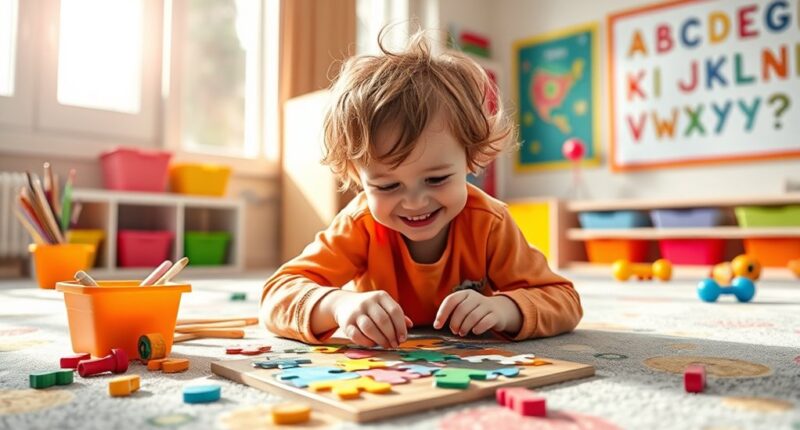To prepare your preschooler for school, start by establishing daily routines that offer structure and security. Build trust with teachers through warm interactions and clear expectations. Engage in pretend play to boost creativity and problem-solving skills. Encourage social skills through group activities and teach emotional intelligence using strategies like deep breathing. Foster early literacy and communication by incorporating fun reading sessions. With these foundations, your child will be set for a successful school experience. Discover more strategies ahead!
Key Takeaways
- Establish structured routines to provide predictability, enhancing emotional security and independence in preschoolers.
- Foster social skills through group play, encouraging teamwork, patience, and conflict resolution.
- Engage in pretend play to develop creativity, empathy, and problem-solving abilities in various scenarios.
- Promote early literacy by incorporating daily read-aloud sessions and playful alphabet activities to enhance language skills.
- Encourage self-reflection and goal-setting to build confidence, agency, and resilience in preschoolers as they prepare for school.
Establishing a Routine for Success
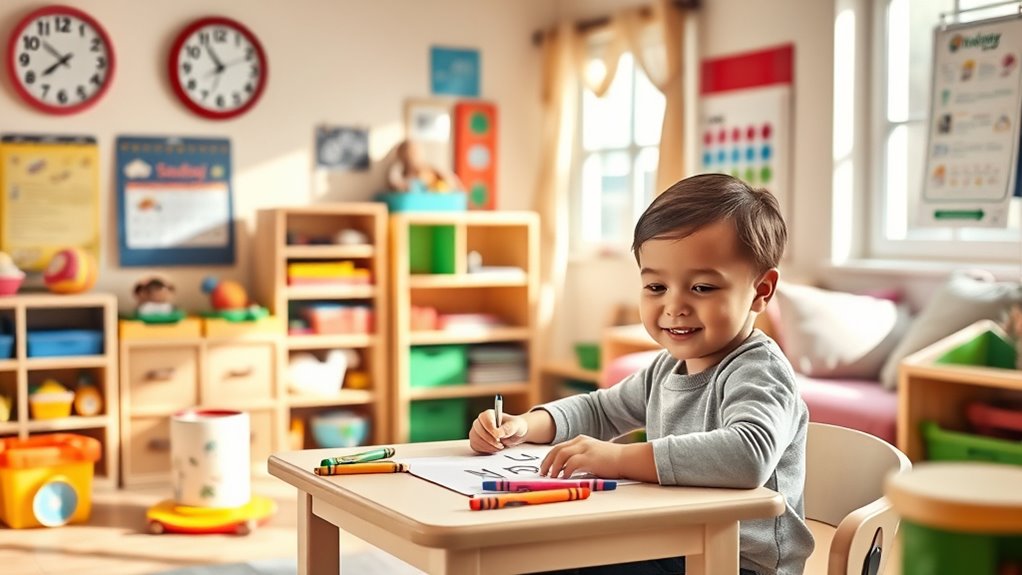
When you establish a routine for your preschooler, you’re setting the stage for their success. Structured routines engage children, enhancing their emotional and social development. Predictability provides a sense of security, allowing them to thrive. Additionally, long-term financial planning for your child’s education can alleviate stress and ensure they have the resources they need as they grow. Proper nutrition during these formative years is critical for brain development, which is further supported by routines that encourage healthy eating habits. Incorporating essential oils in a calming environment can also promote relaxation and focus during routine activities.
Incorporating interactive family activities in daily routines fosters bonding and boosts their well-being. A consistent morning routine, including a nutritious breakfast, helps your child shift smoothly into the day, encouraging independence and ownership of tasks like dressing and brushing teeth.
Likewise, a bedtime routine regulates sleep patterns, essential for cognitive growth. By focusing on these fundamental routines, you not only support your child’s development but also create a nurturing environment that promotes positive behavioral outcomes throughout their day. Establishing a routine also aids in addressing sleep challenges that many families face, providing both consistency and comfort.
Building Trust With Teachers

Building trust with teachers is essential for your preschooler’s development, as it greatly influences their social and emotional growth. When your child feels secure in their relationship with their teacher, they’re more likely to engage positively with peers and show improved academic performance.
Teachers foster this trust through warm interactions, empathy, and clear expectations. By modeling appropriate behaviors and applying positive guidance techniques, they create a supportive classroom environment. As a result, your child may experience less anxiety and more motivation to learn.
When teachers respect diverse backgrounds and adapt their strategies accordingly, it further enhances trust, making your child feel valued. Ultimately, strong, trusting relationships lead to better school experiences and outcomes for your preschooler.
Engaging in Pretend Play

Engaging in pretend play is crucial for your preschooler’s development, offering numerous cognitive and emotional benefits. It fosters advanced thinking and problem-solving skills, helping your child practice critical thinking through imaginative scenarios. As they role-play different professions, they enhance their symbolic understanding and cognitive flexibility. Additionally, engaging in pretend play can be supported by establishing a bedtime routine that encourages creativity and imagination.
Emotionally, pretend play provides a safe space for expressing and managing feelings, allowing your child to develop stronger emotion regulation skills. By taking on various roles, they cultivate empathy and learn to understand different perspectives.
Furthermore, this type of play boosts creativity, encouraging your child to invent new worlds and stories while enhancing their vocabulary through storytelling. Additionally, engaging in pretend play supports emotional intelligence development, enabling children to navigate social interactions more effectively.
Developing Social Skills
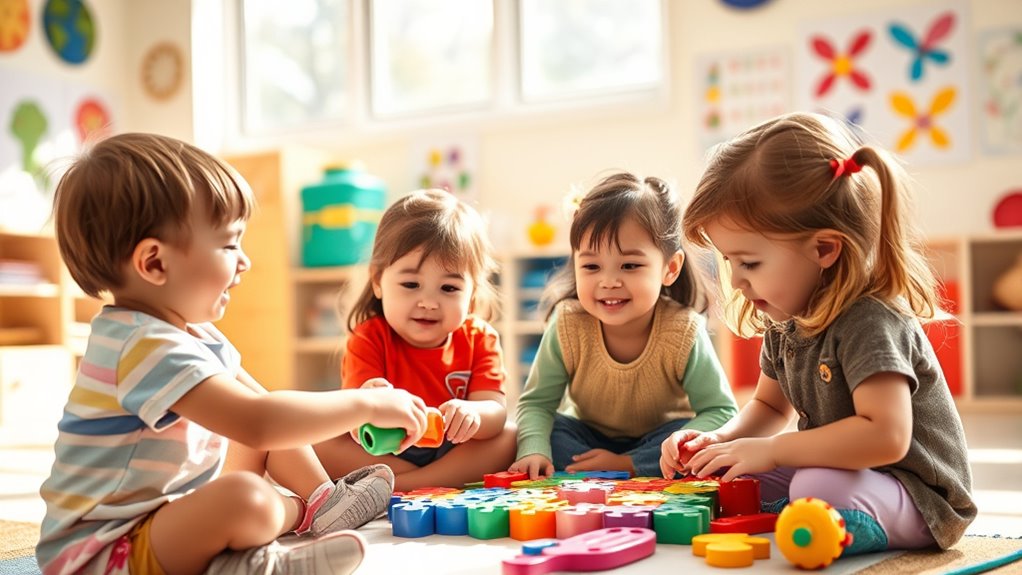
Developing Social Skills
How can developing social skills shape your preschooler’s future? Strong social skills are vital for your child’s emotional regulation and behavior management. They’ll form positive relationships, which boosts their confidence and independence. Developing these skills early can set the foundation for long-term growth in various aspects of their lives, including academics and personal relationships. Additionally, fostering these skills can significantly enhance your child’s ability to process loss and navigate emotional challenges.
By fostering empathy, conflict resolution, and active listening, you’re setting them up for academic success and better mental health outcomes. Engaging in community support can also provide a strong network for both you and your child, enhancing their social experiences. Additionally, utilizing transformative practices can further enhance their ability to navigate social interactions effectively.
Engage your preschooler in group play and turn-taking games to promote teamwork and patience. Use role-playing to teach different perspectives and conflict scenarios for peaceful problem-solving.
Fostering Early Literacy

As you nurture your preschooler’s early literacy, you’ll be laying the groundwork for their future academic success and personal growth.
Focus on developing their oral language skills by engaging in conversations and expanding their vocabulary. Introduce the alphabetic principle through playful activities, helping them connect letters with sounds.
Make print awareness a part of their daily life by pointing out signs and labels, which clarifies the role of written language. Read aloud daily to enhance their language and foster a love for stories.
Encourage phonological awareness with rhyming games and sound activities. Finally, support their writing skills by allowing them to explore writing their names and engaging in collaborative projects, ensuring literacy becomes a fun, interactive experience.
Enhancing Math and Problem-Solving Abilities
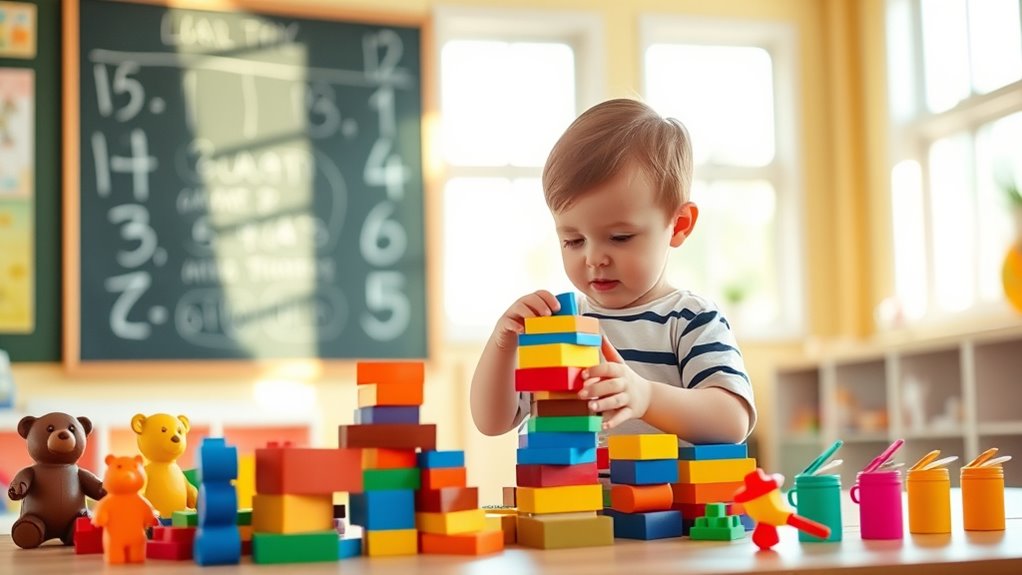
While fostering your preschooler’s math and problem-solving abilities, you’ll be setting the stage for critical thinking skills that will benefit them throughout their education.
Start with counting and sorting games to develop logical thinking. Introduce basic addition and subtraction through fun activities, allowing them to grasp numbers naturally. Engage them with shapes and patterns to enhance their mathematical understanding.
Real-world scenarios make math relatable, while encouraging exploration helps them discover their problem-solving methods. Use logic games and puzzles to sharpen their logical thinking.
Resources like the Problem Solvers Curriculum provide structured activities to improve math skills. Remember, early math foundations are predictive of future academic success, building confidence and paving the way for advanced concepts later.
Improving Communication and Listening Skills
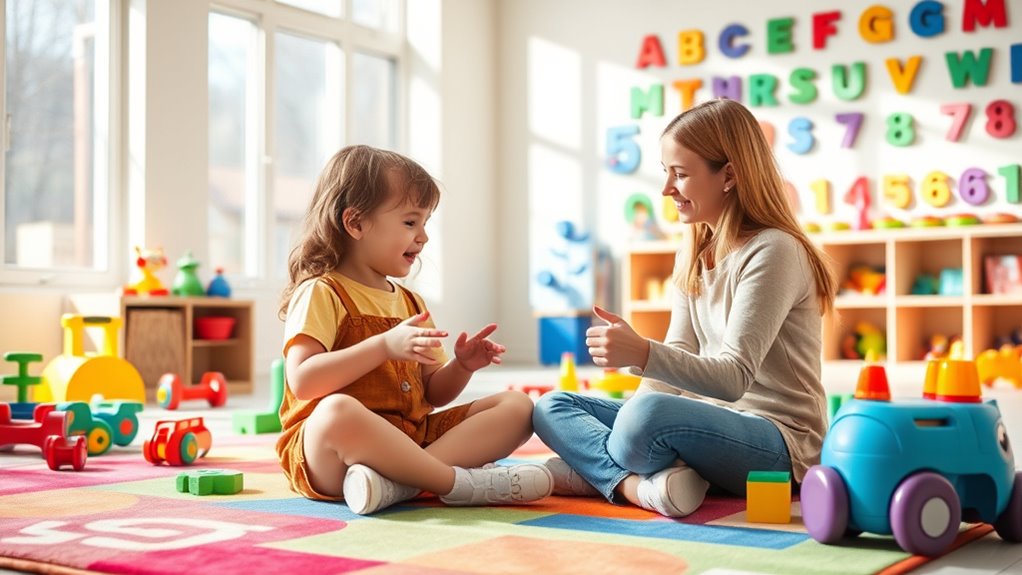
Effective communication and listening skills are essential for preschoolers, ensuring they can express themselves and understand others. You can help your child by encouraging eye contact and minimizing distractions during conversations.
Engage them in discussions by asking questions and inviting their opinions, which enhances their listening abilities. Incorporating role-playing activities and storytelling can also boost these skills while making learning fun.
Regularly practice listening games like “Simon Says” to improve focus in an enjoyable way. Finally, be a role model; demonstrate good communication habits to help your child absorb these skills naturally.
Nurturing Emotional Intelligence and Creativity
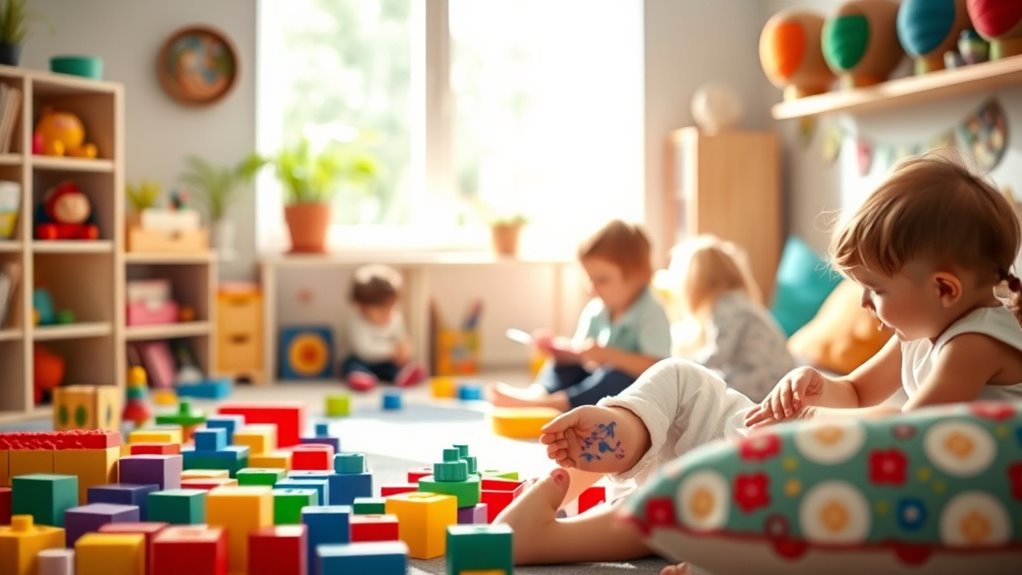
Building on the communication skills you’ve nurtured in your preschooler, it’s important to foster their emotional intelligence and creativity. Start by helping them recognize and understand basic emotions like happiness and sadness. Encourage emotion regulation through strategies like deep breathing or counting. Incorporating mindfulness practices can further support their ability to manage emotions effectively. Engaging in grounding techniques can also help them feel more centered during emotional fluctuations.
Engage in play-based learning and storytelling to enhance their emotional vocabulary. Role-playing can teach them empathy and appropriate responses. Additionally, full sustained attention during creative activities can significantly enhance their ability to express themselves.
Incorporate creative activities that promote self-expression and problem-solving. Art allows them to explore emotions, while group projects build teamwork and communication skills. Additionally, you can introduce concepts from self-reflection and assessment to help them better understand their feelings and reactions. Encouraging them to set small, manageable goals will further empower their sense of agency and confidence.
Frequently Asked Questions
How Can I Help My Child Adjust to Separation Anxiety?
To help your child adjust to separation anxiety, establish a consistent routine that offers familiarity.
Communicate positively about upcoming separations, reassuring them that you’ll return.
Gradually introduce new environments, allowing them to explore at their own pace.
Consider giving them a comfort item, like a favorite toy, for reassurance.
Keep goodbyes brief and upbeat to minimize distress.
Finally, validate their feelings while gently encouraging independence to foster confidence.
What Should I Pack in My Child’s Preschool Bag?
Packing your child’s preschool bag is like assembling a treasure chest for their daily adventures.
You’ll want to include an extra set of clothes, cozy socks, and a favorite toy for comfort. Don’t forget healthy snacks and a spill-proof water bottle to keep them energized!
Add personal hygiene essentials like hand sanitizer, and equip them with basic school supplies in a sturdy backpack.
This thoughtful preparation sets the stage for a fun-filled day!
How Do I Choose the Right Preschool for My Child?
Choosing the right preschool for your child involves several key steps. Start by identifying your child’s needs and learning style, then research local options.
Visit preschools to observe their environments and interact with teachers. Check for accreditation and safety standards, and consider the curriculum focus.
Don’t forget to gather feedback from other parents. Finally, confirm the preschool aligns with your family’s schedule and budget, making a decision that feels right for both you and your child.
What Are Signs My Child Is Ready for Preschool?
When your child shows they’re ready to spread their wings, it’s a good sign for preschool.
Look for them dressing themselves, using the toilet independently, and cleaning up after playtime.
Emotionally, if they handle separations well and express their feelings, they’re on the right track.
Socially, they should enjoy group play and share.
Finally, if they can follow simple instructions and focus on tasks, they’re ready to take that leap into preschool!
How Can I Support My Child’S Learning at Home?
To support your child’s learning at home, create a fun and engaging environment. Use alphabet games and storytelling to enhance their literacy skills.
Encourage curiosity with open-ended questions and simple science experiments. Incorporate physical activities to promote overall health and fine motor skills, like painting.
Establish routines that provide stability, and engage in meaningful conversations to nurture emotional development.
These activities will help your child thrive in their learning journey.
Conclusion
In preparing your preschooler for school, remember that a solid foundation is key. Did you know that children who engage in pretend play can boost their social and cognitive skills by up to 30%? By establishing routines, fostering literacy, and nurturing emotional intelligence, you’re setting your child up for success. Keep encouraging their curiosity and creativity, and watch them thrive as they commence this exciting educational journey. Your involvement makes all the difference!
